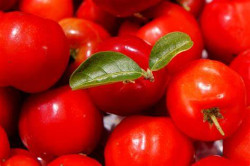Acerola - Valchlor (Mechlorethamine Hydrochloride) Interaction
Herbal: Acerola
Also Known As: Malpighia emarginata, Acerola Cherry, Barbados Cherry, Cereso, Cereza, Cerisier, Chereese, Grosella, Puerto Rican Cherry, Semeruco, West Indian Cherry, West Indies Cherry
Drug: Mechlorethamine Hydrochloride
Brand names:
Valchlor

Medical Content Editor Dr. Brian Staiger, PharmD
Last updated
Jul 06, 2025
Interaction Details
Mechlorethamine Hydrochloride is classified as belonging to the following category: Alkylating Agents
Theoretically, the antioxidant effects of acerola might reduce the effectiveness of alkylating agents.
Acerola contains vitamin C, an antioxidant. There is concern that antioxidants might reduce the activity of chemotherapy drugs that generate free radicals, such as alkylating agents. In contrast, other researchers theorize that antioxidants might make alkylating chemotherapy more effective by reducing oxidative stress that could interfere with apoptosis (cell death) of cancer cells. More evidence is needed to determine what effect, if any, antioxidants such as vitamin C have on chemotherapy.
Interaction Rating
Likelihood of Occurrence
PossibleInteraction has been documented in animal or in lab research, or the interaction has been documented in humans but is limited to case reports or conflicting clinical research exists
References
- Labriola D, Livingston R. Possible interactions between dietary antioxidants and chemotherapy. Oncology 1999;13:1003-8.
- Prasad KN. Rationale for using high-dose multiple dietary antioxidants as an adjunct to radiation therapy and chemotherapy. J Nutr 2004;134:3182S-3S.
- Conklin KA. Cancer chemotherapy and antioxidants. J Nutr 2004;134:3201S-3204S.
Acerola Overview
 Acerola, also known as the Barbados cherry or West Indian cherry, is a small, red fruit that is native to Central and South America. The fruit is known for its high levels of vitamin C, which is a powerful antioxidant that can help to protect cells from damage caused by free radicals.
Acerola is commonly used as a supplement to increase vitamin C intake and it is available in various forms such as capsules, tablets, and powders. It is also often found in juice, jams, and other food products.
Acerola, also known as the Barbados cherry or West Indian cherry, is a small, red fruit that is native to Central and South America. The fruit is known for its high levels of vitamin C, which is a powerful antioxidant that can help to protect cells from damage caused by free radicals.
Acerola is commonly used as a supplement to increase vitamin C intake and it is available in various forms such as capsules, tablets, and powders. It is also often found in juice, jams, and other food products.
Mechlorethamine Hydrochloride Overview
-
Mechlorethamine gel is used to treat early stage mycosis fungoides-type cutaneous T-cell lymphoma (CTCL; a cancer of the immune system that begins with skin rashes) in people who have received previous skin treatment. Mechlorethamine gel is in a class of medications called alkylating agents. It works by slowing or stopping the growth of cancer cells.
Acerola - More Interactions
Acerola interacts with 128 drugs
Interaction Rating Key
These severity listings are for informational use only. Never start, stop or otherwise change your therapy before speaking with your provider.
| Major | The combined use of these agents is strongly discouraged as serious side effects or other negative outcomes could occur. |
| Moderate | Use cautiously under the care of a healthcare professional or avoid this combination. A significant interaction or negative outcome could occur. |
| Minor | Be aware that there is a chance of an interaction. Watch for warning signs of a potential interaction. |
| Unknown | No interactions have been reported or no interaction data is currently available. |
Return to the main supplement interaction checker page
Parts of this content are provided by the Therapeutic Research Center, LLC.
DISCLAIMER: Currently this does not check for drug-drug interactions. This is not an all-inclusive comprehensive list of potential interactions and is for informational purposes only. Not all interactions are known or well-reported in the scientific literature, and new interactions are continually being reported. Input is needed from a qualified healthcare provider including a pharmacist before starting any therapy. Application of clinical judgment is necessary.
© 2021 Therapeutic Research Center, LLC
Drug descriptions are provided by MedlinePlus.
